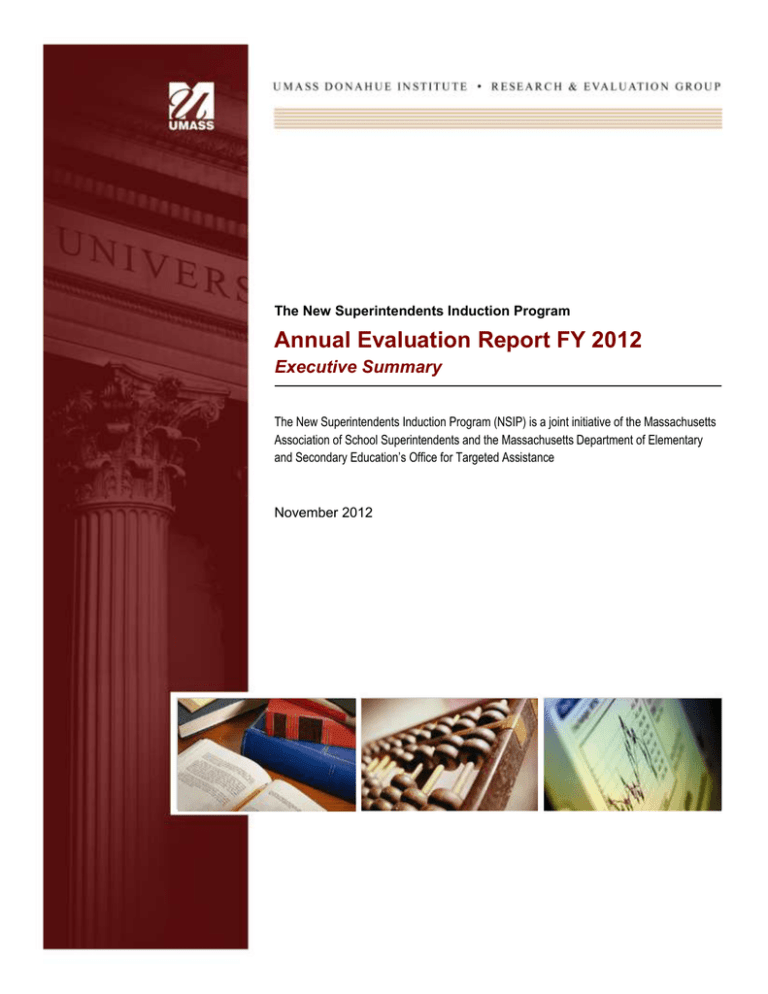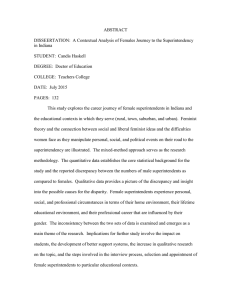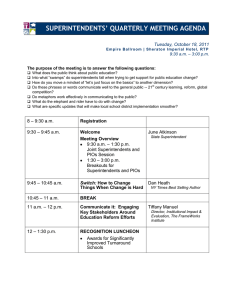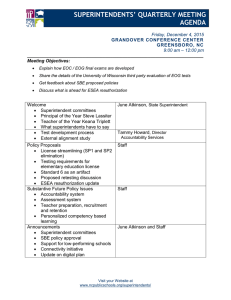11NSIP EvalReport ExecSum
advertisement

The New Superintendents Induction Program Annual Evaluation Report FY 2012 Executive Summary The New Superintendents Induction Program (NSIP) is a joint initiative of the Massachusetts Association of School Superintendents and the Massachusetts Department of Elementary and Secondary Education’s Office for Targeted Assistance November 2012 NSIP Annual Evaluation Report: FY 2012 Executive Summary Executive Summary Introduction The Massachusetts Association of School Superintendents (MASS) and the Massachusetts Department of Elementary and Secondary Education (ESE) have entered into an innovative partnership intended to develop and sustain district leadership and, by extension, enhance district capacity to support school improvement. The New Superintendent’s Induction Program (NSIP) seeks to enhance superintendents’ effectiveness through an induction process centered on “The Massachusetts Way.” The Massachusetts Way is a specific approach to practice emphasizing five core objectives that reflect program designers’ understanding of how to enhance district capacity to catalyze school improvement: Building instructional leadership Developing effective leadership teams Developing collaborative relationships with key constituencies Managing resources strategically Developing and implementing effective systems for supervision and evaluation The program delivers its curriculum through a series of Content Days and supports implementation of key practices through related work assignments and intensive coaching by a team of former superintendents who are themselves receiving extensive professional development in relation to the NSIP curriculum. The intended role of the coach is primarily to support superintendents’ implementation of that curriculum. NSIP is conceptualized as a three-year induction program designed to meet the needs of the Commonwealth’s new1 superintendents, with a cohort of newly hired, first-year superintendents entering the program each July. The first group of 25 superintendents (cohort 1) entered the program in July 2010. Of them, 22 continued into a second year of the program2. A new group of 26 (cohort 2) entered the program in July 2011. As this report was being developed a third cohort of 22 superintendents was entering the program. While Cohort 1 was limited to districts that were in Level 3 or Level 4 accountability status at the time of program entry, later cohorts were also opened to districts classified as Level 1 and Level 2, on a fee basis. The University of Massachusetts Donahue Institute (UMDI) serves as NSIP’s external evaluator. The FY12 goals of the evaluation reflect a shift toward measuring and understanding NSIP outcomes, while continuing to meet program managers’ needs for timely formative feedback. This report summarizes key findings and lessons learned through the second year of NSIP operation. It focuses on core findings emerging from surveys and group interviews as well as ongoing informal observation of coaching sessions and content days. Curriculum and Content Days During the 2011-2012 academic year, cohort 1 met for five content days and cohort 2 met for eight content days. While program designers started the year with curriculum content mapped to particular content days, the specifics were subject to a considerable amount of adjustment and fine-tuning as the year progressed. Changes were based both on experience built through previous content days as well coaches’ input which was informed by their 1 For the purposes of NSIP, new superintendents are defined as individuals with no previous experience as a superintendent or experienced superintendents who are new to Massachusetts. 2 One of the initial 25, one chose to discontinue the program and the other two were no longer working as superintendents. A fourth (included in the 22) resigned her position late in the 2011-2012 school year. UMass Donahue Institute Research and Evaluation Group i NSIP Annual Evaluation Report: FY 2012 Executive Summary ongoing interactions with the participating superintendents. Adaptations were also made from year-to-year based upon the experience of working with the previous cohort. The following bullets offer a summary of the evaluation’s key findings with relation to curriculum and content days: Respondents from both cohorts generally rated the overall value of attending content days as excellent or good. On the whole, cohort 1 superintendents were more positive in their responses than were cohort 2 superintendents. It is evident that introducing a focus on implementation of the new educator evaluation system as a theme for cohort 1 superintendents made the content days feel more relevant for this group. While superintendents from both cohorts expressed the need for more support in management and operations, program managers stress the innovative nature of the focus on strategy not operational issues. The diversity of preparation and previous experience of participants reinforces the need to continue to differentiate content and instruction. It may also be effective to provide additional opportunities for participants with strengths in particular areas to share with their peers. Additional work is needed to effectively integrate the readings and assignments into the content days. While there is an acknowledged need for some flexibility, there should be a conscious effort to follow the planned agenda as closely as possible and to make certain that assignments are explicitly addressed during the session. Assignments and Work Products In addition to the readings and assignments for each content day session, NSIP superintendents are expected to complete a number of key “work products” through their participation in the program. They are: report of entry findings, theory of action, district improvement strategy (development and implementation), classroom visits and principal debriefings, and leadership team development. The following bullets offer a summary of the evaluation’s key findings with relation to assignments and work products: Consistent with the findings for curriculum and content days, cohort 1 superintendents were generally more positive than their cohort 2 counterparts. Most superintendents from both cohorts offered favorable ratings to coaching support related to the assignments, the value of the resulting products to district improvement work, and the value of the assignments for their own professional development. Comparisons to spring 2011 responses from cohort 1 suggest that the rationale for and value of NSIP assignments may become more evident as individuals progress within the program and gain more experience in their positions. Responses of cohort 2 superintendents further reinforce the previous observation that the program needs to improve the explicit linkage and integration of assignments to the curriculum and content days. As a whole, superintendents perceived greater progress on these work products than did coaches. Yet with only one exception (cohort 2 strategy implementation), at least half of all respondents described progress on each product as either substantial or completed/refining. While not widespread, disagreements about the extent of individual progress highlight the need to establish clearer shared understandings of progress between superintendents and their coaches. Coaching Support In their first year, superintendents are allotted eight hours of one-on-one coaching time each month. In the second year, this is scaled back to four hours per month. The following bullets offer a summary of the evaluation’s key findings with relation to coaching support: Slightly more than half of coaching time was focused on work directly related to the NSIP curriculum and about one-third was devoted to other issues of concern to the superintendents. Results for cohort 2 show a marked increase in the percentage of time focused on work directly related to the NSIP curriculum and assignments over the course of their first year in the program. This is consistent with several coaches UMass Donahue Institute Research and Evaluation Group ii NSIP Annual Evaluation Report: FY 2012 Executive Summary comments that they need to more closely adhere to the NSIP curriculum during their coaching sessions and more effectively tie NSIP to the day-to-day work of the superintendent. Superintendents expressed how highly they value the opportunity to address other issues through coaching as a critical means of obtaining help dealing with concrete day-to-day issues that they are facing in their districts, but are not addressed as part of the formal content day curriculum. Cohort 1 superintendents and coaches reported a substantial focus on developing effective systems for supervision and evaluation – a finding that is consistent with the integration of educator evaluation implementation as part of the year 2 curriculum. In contrast nearly one-quarter of cohort 2 superintendents and more than one-third of their coaches reported spending little or no time discussing supervision and evaluation systems. Although not directly responsive to supervision and evaluation systems, many superintendents cited using coaching time to discuss staffing and personnel issues including addressing conflict, hiring new staff, supporting building principals and improving leadership team effectiveness. Both superintendents and coaches expressed a need to focus coaching time in the following areas: Spending more time in school buildings and classrooms Continuing/increasing support for implementation of the new educator evaluation system Focusing more time on strategy development, implementation and refinement Establishing priorities among multiple initiatives and competing responsibilities Increasing the focus on working with school committees Spending more time developing effective leadership teams including issues related to hiring and integrating new staff members Superintendents offered overwhelmingly positive ratings of their coaches’ knowledge and support. While it would be inaccurate to describe the feedback regarding coaches’ performance as anything less than positive, it is notable that cohort 2 ratings of support for implementation of NSIP practices and knowledge of specific practices promoted by NSIP were somewhat lower than their ratings for other aspects. Although coaches have undoubtedly become more familiar and comfortable with NSIP practices, it is important to acknowledge that they require continued and ongoing support to improve their understanding of these practices, which represent a new approach to the superintendency. Impact on Superintendent Capacity and Performance The evaluation plan for NSIP’s second year of implementation reflects an increased attention to outcomes measurement and is intended to provide a foundation for evaluation over the next several years. One aspect of this effort is gauging the extent to which superintendents are improving their own abilities to implement key aspects of program in their districts. It is important to recognize that the survey data analyzed for this report reflect interim measures of impact for a three-year program and thus reflect progress toward desired program outcomes. The following bullets offer a summary of the evaluation’s key findings with relation to impact on superintendent capacity and performance: Most superintendents indicated that NSIP has had a moderate or substantial impact on their view of the role of the superintendent. However, about 40 percent of the superintendents from both cohorts reported that the program has had little or no impact in this regard. Comments suggest that many superintendents feel that their views of the role were already well-aligned with the perspective promoted by NSIP. About two-thirds of responding superintendents indicated that at least 60 percent of their time was focused on activities and initiatives that had a direct impact on the quality of instruction in their district. Some continued struggling to balance the time they spent on instructional leadership compared to management and operations. UMass Donahue Institute Research and Evaluation Group iii NSIP Annual Evaluation Report: FY 2012 Executive Summary Still, most acknowledged that NSIP has helped them focus more on instruction, though many felt that they weren’t spending as much time as the program expects. Nearly all cohort 1 superintendents reported that NSIP had at least modestly improved their ability to create effective leadership teams, serve as an effective instructional leader, and think strategically about district improvement. For most dimensions superintendents reported higher levels of impact than their coaches. The exceptions are the superintendents’ ability to conduct root cause analysis of instructional problems and establish effective systems for supervision and evaluation. Both cohort 1 superintendents and their coaches reported the least impacts on the ability to manage resources in a strategic manner and forge collaborative relationships with key constituencies. Cohort 2 superintendents and coaches generally reported the most impact in the ability to think strategically about district improvement, conduct root cause analysis of instructional problems and serve as an effective instructional leader. Superintendents reported relatively little impact on their ability to manage resources in a strategic manner compared to coaches who rated this as one of the areas where the program had the most impact. Both superintendents and coaches offered relatively low impact ratings for the ability to establish effective systems for supervision and evaluation and forge collaborative relationships for key constituencies. Impact on District Improvement In addition to improving superintendents’ practice, NSIP is expected to positively impact districts as participating superintendents influence system capacity and practice through application of new knowledge, skills and tools. The following bullets offer a summary of the evaluation’s key findings with relation to district improvement: At least half of the cohort 1 superintendents reported their participation had resulted in modest or substantial district improvement. They reported the most improvement for district-level strategy and principal readiness to lead instructional improvement. Their lowest impact ratings were for teacher evaluation systems, school committee productivity, and overall instructional quality. In general, the coaches’ perceptions of impact on cohort 1 districts were well-aligned with superintendents’ perceptions. Compared to superintendents, coaches indicated more improvement in district-level focus on instructional improvement and somewhat less improvement in principal readiness, alignment of budget to strategy and administrator evaluation systems. For nearly all areas cohort 2 superintendents reported less impact than their coaches. The one exception was productivity of district leadership team meetings, which nearly three-quarters of cohort 2 superintendents reported had improved at least modestly as a result of their participation in NSIP. Cohort 2 superintendents also gave relatively high impact ratings for district-level focus on and strategy for instructional improvement. Impact in these areas was also highly rated by their coaches, who also rated alignment of budget to district strategy as an area of relatively strong impact. Superintendents and coaches from both cohorts reported the least impact on teacher evaluation systems. Cohort 2 superintendents and their coaches also reported relatively little impact on administrator evaluation systems. This is reflective of the fact that the cohort 1 curriculum has included a deliberate focus on implementation of the new educator evaluation system, which was not a strong component of the cohort 2 curriculum in 2011-2012. It is anticipated that the associated impact ratings for cohort 2 districts will increase on the spring 2013 survey as they will be focusing more on educator evaluation in their second year of NSIP. Participant Satisfaction and Engagement Survey and interview data reveal high levels of satisfaction among cohort 1 superintendents with more mixed reviews from those in the second cohort. Coaches perceived that about half of the superintendents were very committed to the program. Despite cohort 1 superintendents’ highly positive feedback, coaches indicated that nearly a third of them were only slightly committed to the program. Conversely, although cohort 2 UMass Donahue Institute Research and Evaluation Group iv NSIP Annual Evaluation Report: FY 2012 Executive Summary superintendents tended to be more critical of the program, coaches reported that only 16 percent were less than moderately committed participants. Conclusion As the New Superintendents Induction Program completed its second year, participant and coach feedback suggest that it was increasingly providing critical support to new superintendents’ development and district improvement efforts. Most notably, participating superintendents continued to place considerable value on the coaching provided to them. They offer overwhelmingly positive ratings of their coaches’ knowledge and support. Although coaches have undoubtedly become more familiar and comfortable with NSIP practices over the past two years, it is important to acknowledge that they require continued and ongoing support to improve their understanding of these practices, which represent a new approach to the superintendency. In service of that new approach, coaches are making a concerted effort to more closely adhere to the NSIP curriculum during their coaching sessions and more effectively tie NSIP to the day-to-day work of the superintendents. Yet, superintendents also view the coaching as a critical means of obtaining help with challenging operational issues that are not being addressed through the formal content day curriculum. Evaluation data suggest that many new superintendents struggle to balance the time they spend on instructional leadership compared to management and operations. The lack of attention to these matters has been particularly frustrating for a number of cohort 2 superintendents and has negatively colored their overall satisfaction with NSIP. It is also evident that introducing a focus on implementation of the new educator evaluation systems as a theme for cohort 1 superintendents made the content day sessions feel more relevant for this group. Maintaining some focus on using educator evaluation as a driver of the district improvement strategy should remain a focus of their participation in year 3 of the program. Those linkages should also be made for both cohort 2 and cohort 3 superintendents as a way to ground their learning in practical challenges that they are facing in their districts. Although respondents generally rated the overall value of content days favorably, superintendents and coaches identified a number of opportunities to improve those sessions including: more effectively integrating the readings and assignments into the content day itself; improving on past efforts to differentiate content and instruction given the diversity of preparation and previous experience among the participants; and strengthening coaches’ role in content delivery. As NSIP matures it will be important to develop and implement systems to evaluate the extent to which the program is achieving its intended impact on superintendents and their districts. To date, most superintendents indicate that the program has had a moderate or substantial impact on their view of the role of the superintendent. Most also credit the program with yielding at least a modest improvement in various aspects of their own practice. While many superintendents also reported that their participation has resulted in some improvements in district capacity and practice, it is clear that more time is required to see NSIP principles effectively integrated throughout the organizations in service of the ultimate goal of creating and sustaining improvements in student achievement. UMass Donahue Institute Research and Evaluation Group v



